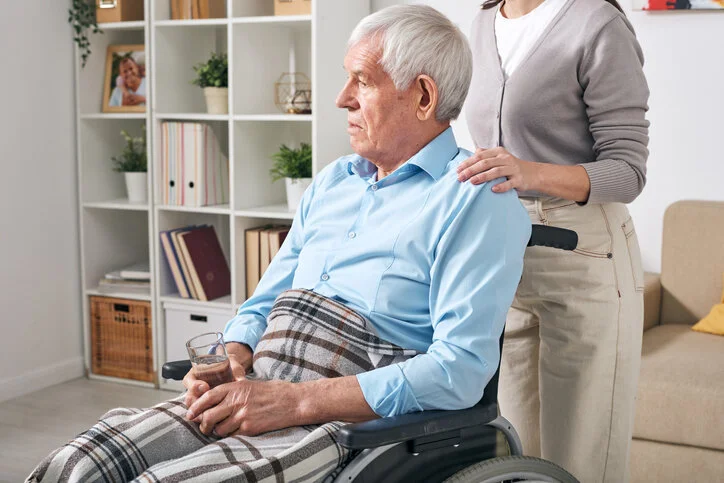The Institutional Oral Hygiene Crisis: Guest Blog By Marta Kazandjian Ranaldo Medical Speech Pathologist, Board Certified in Swallowing Disorders, and Integrative Health Coach
There are millions of patients in institutions who are incapable of attending to their own oral hygiene needs for one reason or another. The population includes the elderly, traumatic brain injury patients, Alzheimer's patients, stroke victims, those with limited mobility, and those with several other chronic and acute illnesses too numerous to name. The staff provides little to no oral care. There is a much greater chance of finding a hair salon in these facilities than a dental operatory. Considering that brushing twice daily and flossing once is the standard recommendation, this is a tragedy.
Most often, the upkeep of oral hygiene is left to the patient or loved one. Care providers get involved when the patient complains. Many are incapable of communicating. Most of the time, the staff will not look in the mouth, and when they do, they have no idea of how to assess any dental problems.
There are many reasons for the institutional oral hygiene crisis. The most obvious is that when a patient enters a facility, the main focus is on the circumstances that led them there. Whether it is elder care or traumatic brain injury, the focus is on their inability to care for themselves. The mouth gets wholly overlooked in most instances.
The second most apparent issue centers around the length of stay. In a senior living facility, the average stay before death range from 27% of patients who stay less than two years, 12% 2-5 years, and 14% five years or more. (1)
None of the intervals are short enough to avoid proper dental hygiene without a high risk of developing a dental infection. In the case of a teenager suffering a traumatic brain injury from an auto accident, no one can possibly know the duration of stay, and neglecting oral care is a big no-no.
Compounding the issue is that the facilities must provide a diet based on My Plate, formerly known as the food pyramid. Such diets are risk factors for tooth decay and gum disease and obesity, diabetes, and other chronic modern illnesses. Please read my post on it here if you want more information.
The combination of poor food quality and inadequate oral hygiene contributes to worsening medical conditions both before and during long term care facilities.
No one knows more about the subject than my friend and fellow integrative medical practitioner, Marta. Marta Kazandjian Ranaldo, MA CCC-SLP BCS-S, CPT-EFS is a nationally recognized Medical Speech Pathologist who is Board Certified in Swallowing Disorders. She has graciously taken time out of her busy schedule as a nationally recognized swallowing specialist to enlighten us:
Click Here For Marta’s Impressive Bio
Medical speech pathologists spend a good portion of our day looking into people's mouths and wondering if their poor oral hygiene could have contributed to their medical condition. Poor oral hygiene is a risk factor for many related illnesses, including diabetes, cardiovascular disease, cancer, pregnancy, viral, bacterial, fungal pneumonias, and aspiration pneumonia. I am a board-certified swallowing disorders specialist, and I am consulted by the medical team to evaluate and treat patients who are unable to eat and drink safely. A swallowing disorder or dysphagia can result in food or liquid entering the airway or lungs, creating the potential for a lung infection, often referred to as aspiration pneumonia. Aspiration pneumonia can be serious and, coupled with other medical conditions, can be life-threatening. In a landmark study in 1998, Dr. Susan Langmore and colleagues helped identify best predictors of aspiration pneumonia in a cohort of elderly, community, and institutionally dwelling adults: dependent for oral care, inability to self-feed/dependent for feeding, number of decayed teeth, tube feeding, more than one medical diagnosis, number of medications and smoking. These authors concluded that dysphagia was a significant risk for aspiration pneumonia but generally not sufficient to cause pneumonia unless other risk factors were present. So you might ask then, why is oral care so critical? Poor oral hygiene will cause dental plaque to form a dense bacterial biofilm that, if aspirated, can increase the likelihood of developing pneumonia. There are over 600 species of bacteria in the mouth (Keijser et al., 2008). Sheffler (2014) reports that if you scrape a cubic millimeter of your teeth in the morning before you brush your teeth, you can collect up to 10 billion microorganisms! Findings by Alexander et al. and Saxton et al., as reported by Rowshani, Timmerman, and Van de Velden (2004), show that plaque can recolonize on tooth surfaces within 3 hours of cleaning and to original concentration levels in less than 24 hours in healthy persons.
For people with periodontal disease, plaque may recolonize within 5 minutes of cleaning (Ashford, 2012).
Recall Langmore's work and the dependency on feeding and tube feeding as predictors for developing aspiration pneumonia.
Speech pathologists often highlight the importance of effective manual cleaning for all patients, even those individuals who do not feed themselves (and therefore can't clean their mouths) or eat and drink by mouth. Oral care involves manually and vigorously cleaning the teeth and other oral structures such as the tongue, palate, and gums twice a day (American Dental Association). For institutionalized patients, we often see nursing staff use foam swabs to clean the mouth during care. Numerous published research studies have confirmed the need to use a toothbrush to remove dental plaque effectively.
Increasing the frequency of brushing for more compromised patients may reduce the risk of infection. Utilizing toothpaste and mouth rinses such as chlorhexidine, an antimicrobial agent, helps as a pathogen deterrent. Families can be instructed in safe brushing techniques to improve oral hygiene and reduce their loved one's risk of developing pneumonia. Remember, brushing your teeth prevents more than cavities and bad breath.



